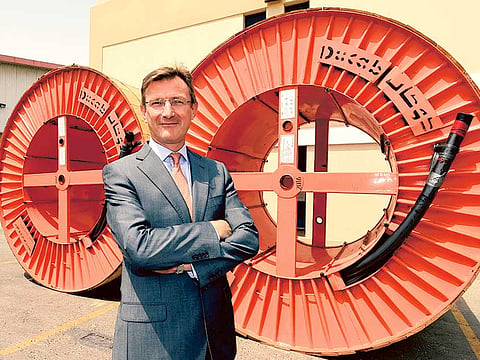Ducab strings together a high-growth strategy
Investments in speciality cables and capacities help company gain new overseas markets

Dubai: An “old economy” company it may be, but Ducab still has a few — and new — moves to remain well entrenched in the UAE’s fast reshaping manufacturing sector.
And as the strategy unfolds, the company — jointly owned by the Dubai and Abu Dhabi government-owned investment funds — finds that it is less exposed to the highly cyclical nature of the construction sector, its main client.
“We now have our cables being sold to the nuclear industry — having recently exported to a project in South Korea as well as earlier supplying the Barakah power plant in Abu Dhabi,” said Andrew Shaw, Managing Director of Ducab in Jebel Ali. “There’s also the shipping industry we are supplying to, and that’s something we could do a lot more of in future.
“Five years ago, we realised we couldn’t stay dependent on construction cycles and that we had to start selling a lot more outside of the UAE and region. Over the last two years, Ducab has been pressing ahead — more strongly — in formulating our geographic and product strategy.”
The outreach is starting to show up on Ducab’s numbers. Sales last year totalled a substantial Dh5.1 billion, and it operates three sites in the UAE (two in Abu Dhabi apart from the original facility in Dubai) and a fourth in the UK, through its acquiring of AEI Cables in 2014. (For comparison’s sake, sales in 1997 was Dh287 million and it only operated a single plant.) The UAE’s industrial sector is going through a sharply defined upswing. The merger of IPIC (International Petroleum Investment Co) and Mubadala will create a behemoth that will straddle the global markets. Recently, there have also been mega capacities created in aluminium through Emirates Global Aluminium, formed through combining Dubai’s Dubal with Emal in Abu Dhabi.
Existing capacities
In many ways, the shareholding changes at Ducab in the early part of the last decade was a harbinger of current trends. This was brought about by the Dubai and Abu Dhabi governments sharing equal stakes in the entity after buying out what was earlier held by UK’s Balfour Beatty Group.
Shaw rates as highly unlikely Ducab deciding to go in for any new plants outside of the UAE. “One decides on overseas production facilities as a sort of hedge against import tariff barriers in those countries,” he said. “That situation doesn’t exist for us. We have got distributors in each of our key overseas territories to do the needful.
“In terms of adequate existing capacities, we do have enough going on at our plants in the UAE. What we are doing more of is add production of speciality cables, helping us serve niche requirements and carry a higher margin.”
Ducab’s emphasis on speciality cables cannot be overstated. On low-voltage cables, there is ample local and regional production. “It’s an extremely competitive situation and we need to put up a lot of fight for our share of the market,” Shaw said. “But further up the product chain, there are fewer competitors and that represents an advantage for us.
“Our purchase of UK’s AEI in 2014 gives us more of that strength, giving us access to clients in marine and mining industries. Marine could prove especially interesting for us what with the many shipyards in operating in the UAE. Plus, there are the potential customers outside. These are end-use sectors where it’s not just about the price on the cables.
Opportunities
“We have got all the certifications — from Lloyd’s, DNV and Veritas — in place for the marine products’ range. It’s going to be a long game … but we are prepared for that.”
Amid all the attention on possibilities in other sectors, Ducab is not about to take its eyes off construction. Right through to the end of the decade, there will be opportunities presenting itself, with the mobilisation on major works related to Expo 2020.
“The biggest user of cables is by construction and industrial — that’s the fact,” said Shaw. “What we have done is build a range of products built over and above what we have already achieved. We want to be ready well ahead of the general industrial development that’s going to happen in this market and elsewhere.”
Clearly, there are new rules of the game for the old economy giants. And Ducab seems to be well-versed in stringing them together.
Factbox: Ducab — a timeline
It was in 2001 that Ducab became a complete UAE-owned enterprise. This was done after the UK’s Balfour Beatty sold its stake in the cable giant. (Balfour Beatty picked up the Ducab exposure after it bought BICC, the UK based cable giant of its time.)
Ducab (or Dubai Cables Co.) was formed in 1979 as a joint venture between Dubai Government and BICC. Abu Dhabi’s General Industries Corp. (GIC) bought in during 1997.
Sign up for the Daily Briefing
Get the latest news and updates straight to your inbox



